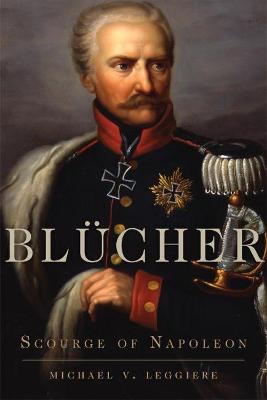Campaigns and Commanders
2 total works
At a time when Napoleon needed all his forces to reassert French dominance in Central Europe, why did he fixate on the Prussian capital of Berlin? Instead of concentrating his forces for a decisive showdown with the enemy, he repeatedly detached large numbers of troops, under ineffective commanders, toward the capture of Berlin. In Napoleon and Berlin, Michael V. Leggiere explores Napoleon's almost obsessive desire to capture Berlin and how this strategy ultimately lost him all of Germany.
Napoleon's motives have remained a subject of controversy from his own day until ours. He may have hoped to deliver a tremendous blow to Prussia's war-making capacity and morale. Ironically, the heavy losses and strategic reverses sustained by the French left Napoleon's Grande Armee vulnerable to an Allied coalition that eventually drove Napoleon from Central Europe forever.
One of the most colorful characters in the Napoleonic pantheon, Gebhard Leberecht von Blucher (1742-1819) is best known as the Prussian general who, along with the Duke of Wellington, defeated Napoleon at the Battle of Waterloo. Throughout his long career, Blucher distinguished himself as a bold commander, but his actions at times appeared erratic and reckless. This magnificent biography by Michael V. Leggiere, an award-winning historian of the Napoleonic Wars, is the first scholarly book in English to explore Blucher's life and military career - and his impact on Napoleon.
Drawing on exhaustive research in European archives, Leggiere eschews the melodrama of earlier biographies and offers instead a richly nuanced portrait of a talented leader who, contrary to popular perception, had a strong grasp of military strategy. Nicknamed ""Marshal Forward"" by his soldiers, he in fact retreated more often than he attacked. Focusing on the campaigns of 1813, 1814, and 1815, Leggiere evaluates the full effects of Blucher's operations on his archenemy.
In addition to providing military analysis, Leggiere draws extensively from Blucher's own writings to reveal the man behind the legend. Though tough as nails on the outside, Blucher was a loving family man who deplored the casualties of war. This meticulously written biography, enhanced by detailed maps and other illustrations, fills a large gap in our understanding of a complex man who, for all his flaws and eccentricities, is justly credited with releasing Europe from the yoke of Napoleon's tyranny.
Drawing on exhaustive research in European archives, Leggiere eschews the melodrama of earlier biographies and offers instead a richly nuanced portrait of a talented leader who, contrary to popular perception, had a strong grasp of military strategy. Nicknamed ""Marshal Forward"" by his soldiers, he in fact retreated more often than he attacked. Focusing on the campaigns of 1813, 1814, and 1815, Leggiere evaluates the full effects of Blucher's operations on his archenemy.
In addition to providing military analysis, Leggiere draws extensively from Blucher's own writings to reveal the man behind the legend. Though tough as nails on the outside, Blucher was a loving family man who deplored the casualties of war. This meticulously written biography, enhanced by detailed maps and other illustrations, fills a large gap in our understanding of a complex man who, for all his flaws and eccentricities, is justly credited with releasing Europe from the yoke of Napoleon's tyranny.

